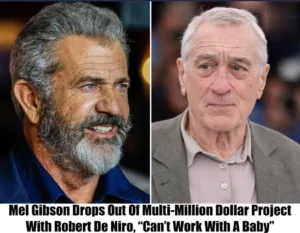
The recent upheaval in Hollywood has sent shockwaves through the industry, as reports emerge of a high-profile project veering off course due to a clash of titans. The $50 million venture, previously cloaked in secrecy, promised to be a cinematic masterpiece, with two revered actors poised to share the screen. Yet, the sudden departure of Mel Gibson has plunged the project into uncertainty, leaving fans and insiders alike grappling with its fate.
Insiders privy to the project’s inner workings divulge that the rift between Gibson and Robert De Niro stems from deeply entrenched ideological disparities, particularly concerning the perceived encroachment of ‘wokeness’ in Tinseltown. While De Niro has been unabashed in his vocalization of social and political stances, Gibson, no stranger to controversy himself, reportedly found the project’s thematic trajectory uncomfortably aligned with what he perceives as an excess of political correctness.
Gibson’s career, marked by stellar performances juxtaposed with public fallouts, has been a rollercoaster of acclaim and criticism. The actor-director’s past remarks, deemed by many as anti-Semitic and misogynistic, have cast a shadow over his legacy. Despite these controversies, Gibson has managed to stage comebacks with successful ventures like “Hacksaw Ridge” and “Daddy’s Home 2.” His abrupt exit from the $50 million project raises pertinent questions about the interplay between personal convictions and professional collaborations in the cutthroat world of entertainment.
On the opposing end stands Robert De Niro, a stalwart of the silver screen renowned for his impassioned performances and outspoken advocacy. De Niro’s public persona is synonymous with progressive values and a steadfast commitment to leveraging his platform for societal change. While his ‘wokeness’ has earned him both admiration and rebuke, the clash with Gibson underscores the complexities of reconciling divergent ideologies within collaborative artistic endeavors.
With Gibson’s departure, the multimillion-dollar project finds itself at a crossroads. The absence of his towering presence in Hollywood threatens to derail the production’s momentum, potentially necessitating a reassessment of its thematic trajectory or even a complete overhaul. This development serves as a poignant reminder of the vulnerability of high-profile projects to the personal beliefs and interpersonal dynamics of those involved.
Reactions within the industry have been mixed, reflecting the nuanced nature of the debate at hand. Some argue fervently that personal ideologies should never impede artistic collaborations, advocating for a diversity of thought within creative circles. Conversely, others contend that artists bear a responsibility to consider the potential ramifications of their views on collaborative projects, particularly in an era where public opinion holds sway like never before.
The clash between Gibson and De Niro is but one instance in a long history of ideological schisms impacting Hollywood ventures. As an industry often perceived as a bastion of liberal values, Hollywood grapples continuously with the challenge of fostering cohesion amidst a mosaic of perspectives. This incident reignites discussions surrounding the industry’s capacity to navigate ideological divides while upholding its commitment to producing compelling and inclusive content.
Yet, beyond the immediate project lies a broader narrative that transcends the realm of entertainment. Gibson’s departure serves as a microcosm of the wider sociopolitical landscape, highlighting the pervasive polarization that grips society at large. As divisions deepen and discourse grows increasingly fraught, the entertainment industry finds itself at a crossroads, tasked with reconciling creative expression with commercial viability in an ever-evolving cultural milieu.
In light of these developments, Gibson’s decision to withdraw from the $50 million project underscores the delicate dance between personal convictions and professional collaborations in Hollywood. The clash between these two cinematic icons serves as a poignant reminder of the inherent complexities of navigating divergent ideologies within the industry. As the entertainment landscape continues to evolve, this incident prompts introspection on the future of artistic collaborations and the enduring influence of personal beliefs on the narratives that grace the silver screen.